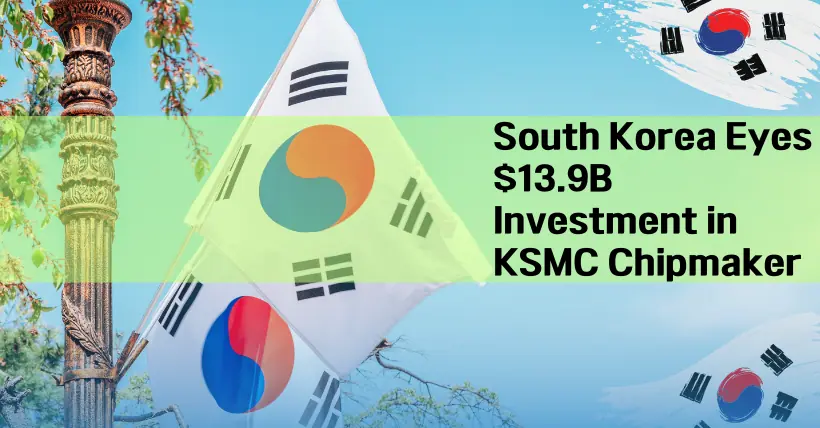Recently, according to The Korea Biz Wire, although Samsung Foundry is the leading foundry manufacturer in South Korea, the South Korean government, at the initiative of industry experts and scholars, may consider creating a government-funded foundry, tentatively named Korea Semiconductor Manufacturing Company (KSMC).
The proposal was raised at a seminar organized by the National Academy of Engineering of Korea (NAEK). The plan aims to address structural weaknesses in the industry, such as the over-reliance on Samsung’s advanced nodes below 10nm without mature process technologies. Due to the lack of manufacturing diversity in South Korea, smaller system semiconductor companies find it difficult to thrive. In contrast, companies like UMC and Powertech, which focus on mature processes and specialty technologies, complement TSMC’s advanced technologies, enriching Taiwan’s semiconductor supply chain, where over 250 chip design companies thrive in Hsinchu.
Ahn Ki-hyun of the Korea Semiconductor Industry Association has called for long-term investment from the South Korean government in KSMC. Experts predict that an investment of 20 trillion KRW (13.9 billion USD) into KSMC by 2045 could yield 300 trillion KRW (208.7 billion USD) in economic returns.
However, the biggest question is whether 13.9 billion USD is enough to establish a chip manufacturer. Another concern regarding public-funded companies like KSMC is whether they can develop advanced manufacturing technologies and secure enough orders from clients to be profitable. In addition to semiconductor manufacturers, South Korea needs more fabless chip design companies and software developers.
Although South Korea, due to Samsung and SK Hynix, is the largest memory chip producer globally, it lags far behind Taiwan in logic process technology and chip design. While Samsung continues to make efforts to catch up with TSMC, the situation has not improved significantly.
According to the report’s analysis, the main challenges facing South Korea’s semiconductor industry include the widening technological gap with international competitors, insufficient investment attractiveness, sluggish growth of fabless companies, talent shortages, and restrictive regulations. Experts at the seminar emphasized the urgent need to address these issues to maintain South Korea’s global leadership in the semiconductor field.
SK Hynix’s CEO proposed repurposing Samsung’s old fabs for traditional process technologies. NAEK called for enhanced R&D efforts and fiscal incentives, such as subsidies and tax credits. Other suggestions included easing regulatory burdens, especially work-time restrictions. TSMC engineers have publicly stated that extending work hours can accelerate the development of advanced process technologies.
Taking TSMC as an example, it was founded by Morris Chang in the 1980s with the invitation and funding of the Taiwanese government. Although TSMC is not the only semiconductor manufacturer in Taiwan, this flagship foundry is fundamentally important to Taiwan’s semiconductor ecosystem.
NAEK’s initiative draws inspiration from Taiwan’s semiconductor ecosystem, where over 250 fabless companies thrive in the Hsinchu Science Park. NAEK suggests that by creating KSMC with government support, South Korea could replicate this success and provide resources for small companies to grow alongside industry giants like Samsung and SK Hynix.
SK Hynix CEO Kwak No-jung proposed directly supporting smaller material, parts, and equipment suppliers, which would benefit large companies that currently have to source many materials from Japan and Taiwan, resulting in additional costs.
Related:
- 2025 Lessons from South Korea Semiconductor Sector
- No Fight, No Future: Samsung 2025 Survival Crisis
- Is the Move to 5nm Chip Technology Part of a Conspiracy?
- SEMICON Korea 2025: February 19-21 in Seoul’s COEX
- Global Wafer Fab Construction Speed and Cost Comparison

Disclaimer:
- This channel does not make any representations or warranties regarding the availability, accuracy, timeliness, effectiveness, or completeness of any information posted. It hereby disclaims any liability or consequences arising from the use of the information.
- This channel is non-commercial and non-profit. The re-posted content does not signify endorsement of its views or responsibility for its authenticity. It does not intend to constitute any other guidance. This channel is not liable for any inaccuracies or errors in the re-posted or published information, directly or indirectly.
- Some data, materials, text, images, etc., used in this channel are sourced from the internet, and all reposts are duly credited to their sources. If you discover any work that infringes on your intellectual property rights or personal legal interests, please contact us, and we will promptly modify or remove it.



